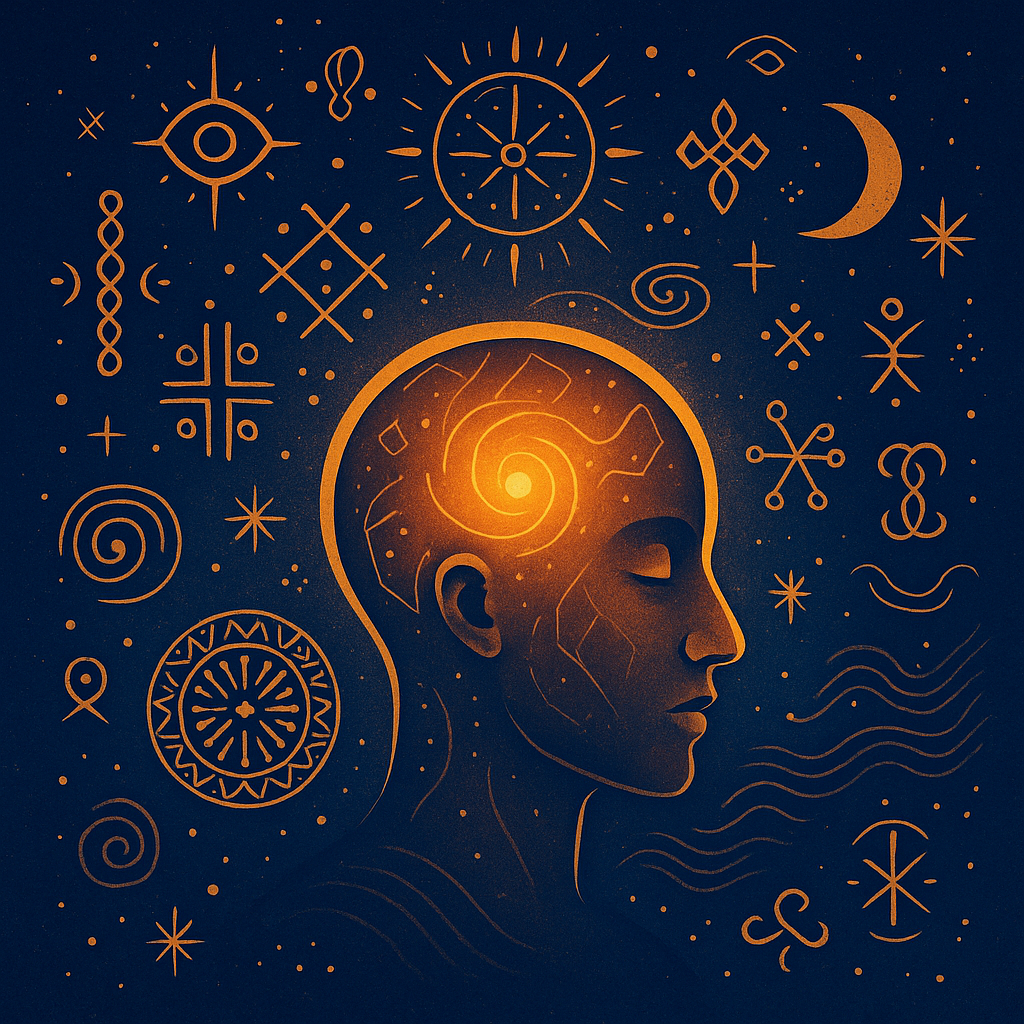Destiny — According To Ifá
In Ifá, the Yoruba philosophical and spiritual system, destiny — called “ayanmo” or “ipin ori” — is one of the most profound metaphysical concepts. It weaves together ideas of freedom, fate, divine choice, and self-fulfillment into a unified understanding of human existence and cosmic order.
🌿 1. The Origin of Destiny (Ayanmo)
According to Ifá cosmology, before a soul is born into the physical world (ayé), it journeys to the spiritual realm of Òrun, where it kneels before Olódùmarè (the Supreme Being) to choose a destiny — ayanmo.
This moment is called “Akunleyan”, meaning “that which is chosen kneeling.”
- The soul selects an “ori”, literally “head,” which in Ifá metaphysics represents the inner divinity and personal destiny of each being.
- Once chosen, this destiny is sealed — Akunlegba, meaning “that which is received kneeling.”
Thus, before birth, each person freely chooses their own path, but once incarnated, that choice becomes a binding metaphysical covenant.
“Ayanmo kii yipada” — Destiny cannot be changed.
“Ṣùgbọ́n a lè ṣe atunṣe òrì” — But the head can be aligned or corrected.
This paradox — that destiny is both chosen and fixed — lies at the heart of Ifá metaphysics.
🔮 2. The Nature of Ori: The Inner Deity
In Ifá, the Ori is not just the physical head but the divine essence within — the true self that guides and determines one’s fortunes, failures, and fulfillment.
While Orisha (divine forces like Ogun, Oshun, and Shango) govern the external world, Ori governs the individual’s internal world.
No deity, not even Orunmila, can override one’s Ori.
“Ori la ba bo, a ki ba orisa bo” —
One must first worship their Ori before the Orisha.
Metaphysically, this places the seat of destiny within the self, making each human a microcosm of divinity and freedom.
🌍 3. Destiny, Choice, and the World of Duality
The world (Ayé) is seen as a marketplace where each soul comes to fulfill its chosen contract. Life’s experiences — joy, loss, success, suffering — are all opportunities for destiny to express itself through action and wisdom.
But since the human mind forgets what the soul chose before birth, divination (Ifá) becomes the means of remembrance.
Through Orunmila — the Orisha of wisdom and fate — Ifá allows the individual to rediscover, realign, and fulfill their original purpose.
This process is called “atunse ori” — the repair or realignment of the head.
⚖️ 4. Freedom and Necessity: The Paradox of Ifá Metaphysics
Ifá resolves the tension between fate and free will through a subtle metaphysical logic:
| Concept | Description |
|---|---|
| Ayanmo (Destiny) | The fixed essence of what the soul chose before birth — unchangeable in nature. |
| Ipinnu (Choice) | The daily exercise of will within destiny — how one responds to life’s unfolding. |
| Ori | The divine spark and personal deity guiding that destiny. |
| Orunmila / Ifá | The cosmic wisdom that helps humans interpret and align with destiny. |
In this view, fate and freedom are not opposites but complementary layers of existence:
Destiny defines the framework, while choice defines the experience.
🌀 5. Destiny as Harmony with Cosmic Order
The goal of life, according to Ifá, is to live in harmony with one’s Ori — to express the divine will encoded in one’s destiny through good character (ìwà pẹ̀lẹ́) and wise action.
When one lives against their Ori, life becomes chaotic, filled with ìpẹ̀yà (misfortune). When one honors and aligns with it, life flows smoothly — this is called ayé rere (a good life).
Thus, destiny in Ifá is not passive fatalism. It is active alignment — a conscious practice of remembering who you truly are.
✨ 6. Metaphysical Implications
-
Ontological Dualism:
The human being exists simultaneously in Òrun (spirit) and Ayé (matter). Destiny is the bridge between both realms. -
Teleological Ethics:
Morality is not imposed from outside; it arises from living in tune with one’s chosen destiny. To act against it is to act against one’s divine nature. -
Sacred Individualism:
Each Ori is unique. Even identical twins have different destinies. Therefore, comparison is meaningless — your path is your own covenant. -
Cyclical Time:
Destiny unfolds in cycles. Failure to fulfill one’s ayanmo may lead to reincarnation (atunwa) until the lesson is complete.
🕯️ 7. In Summary
Destiny, in Ifá metaphysics, is a spiritual contract of selfhood, chosen in freedom, lived through necessity, and fulfilled through wisdom.
It unites fate and freedom, divine and human, cosmic and personal in one seamless rhythm.
“A kì í mọ ayanmo eni, ká má bẹ́ Ifá”
“No one knows their destiny without consulting Ifá.”
Through this dialogue between Ori and Orunmila, the human being learns to walk the line between heaven and earth — consciously shaping what was once unconsciously chosen.

Leave a Reply